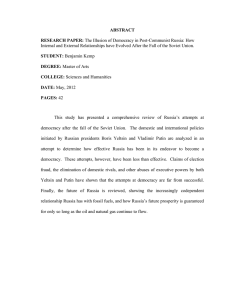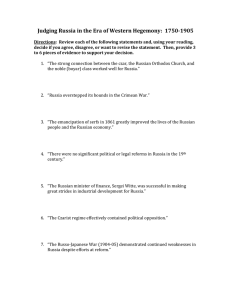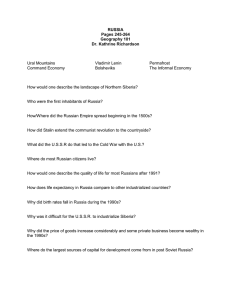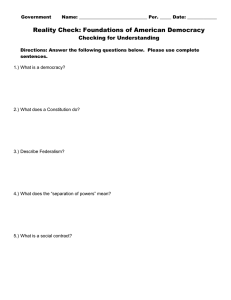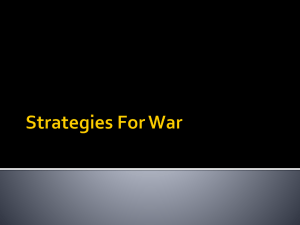Liberty, Political Democracy and Constitutionalism in The new Russia
advertisement
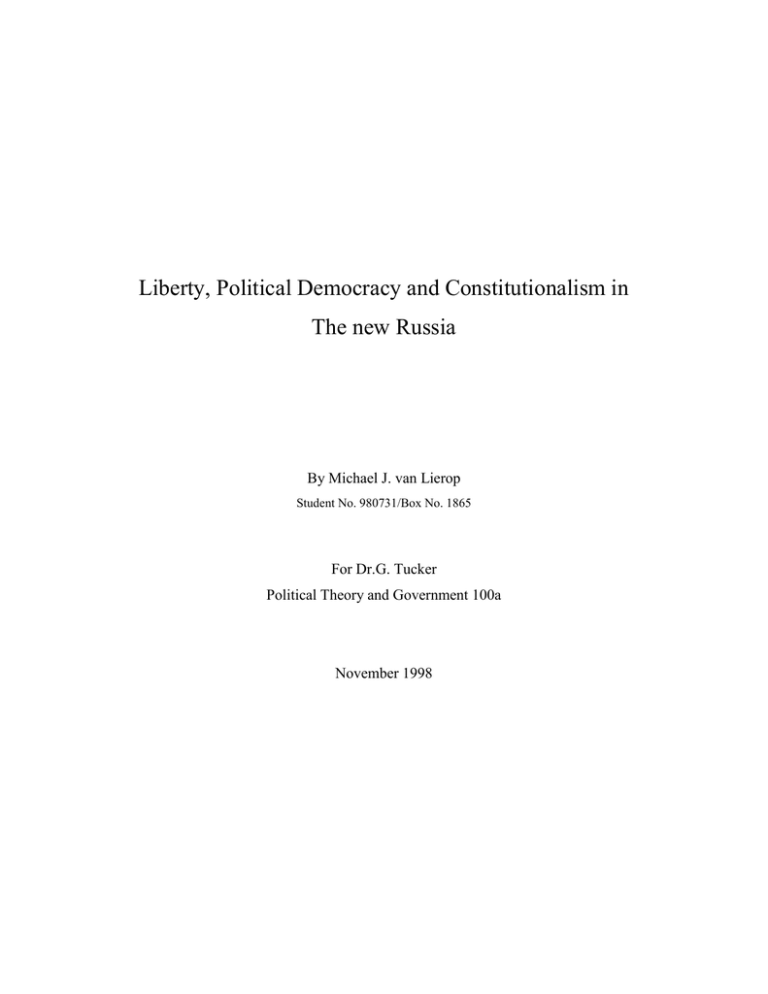
Liberty, Political Democracy and Constitutionalism in The new Russia By Michael J. van Lierop Student No. 980731/Box No. 1865 For Dr.G. Tucker Political Theory and Government 100a November 1998 Michael J. van Lierop Liberty, Political Democracy and Constitutionalism In the new Russia Liberty, Political Democracy and Constitutionalism in the new Russia The very notions of liberty, democracy and constitutionalism are at the heart of a great many political issues and debates, most notably in the Western world. As Russia begins to emerge from the grandiose reforms of the last decade, reforms that have shifted Russian socio-political and economic concerns toward Western values and systems, it is evident that these notions are as relevant and applicable to this former Soviet state as they are to the liberal democracies and free markets of Europe and North America. Indeed, the former core of the Soviet empire has become the focal point of reform based on the ideas and concepts that have founded the largely successful political and economic systems of the West, notions rooted firmly in the sanctity of the liberty of man, in the common desire for democracy and the need for constitutional bounds. This paper will examine in detail the aspects of the new Russia that, firstly, delineate the true nature of this new democracy; secondly, outline the emergence of constitutionalism; and lastly, suggest the extent of the prevalence, or lack thereof, of actual liberty and human freedom. Democracy in the new Russia The rebirth of Russia has been a long and largely incomplete process. Still, it began with the fall of the Soviet Union and has continued since in varying forms and to varying degrees. The forces of reform, represented by Gorbachev’s socially, politically, 1 Michael J. van Lierop Liberty, Political Democracy and Constitutionalism In the new Russia economically and historically revolutionary policies of perestroika and glasnost led to a rise in nationalism and were, in essence, the backbone to the revolt against the old communist structure. Indeed, “democracy and nationalism were not opposed but complementary in the anti-communist revolution; only under conditions of postcommunism did a contradiction emerge between the two”1. Whether it was a case of democracy leading to the disintegration of the USSR or vice versa remains a heated debate in most scholarly circles; nevertheless, it is clear that in most other post-Soviet states nationalist revolts preceded democratic revolts. … in Russia it was the democratic insurgency against communism that made possible the rebirth of the nation. As far as the liberals were concerned, it was clear that democracy and empire in the old USSR were incompatible, but the disintegration of the empire was not a sufficient, though probably a necessary, condition for the emergence of democracy.2 In Russia, it seems, the minimalist definition of democracy was and continues to be applied, as this “definition of democracy suggests a limited role for politics itself; implying indeed that democracy is a form of government rather than a way of life”3 as appears to be the case. In fact, it is highly arguable that Russia in its past and present form lacks the prerequisites for the development of a dynamic democratic system such as those in Western Europe. The notion of political culture, especially civic culture in terms of the ideas, values and attitudes of the Russian people that bind and sustain a political system, seems to be a notion of questionable historical foundation. The dramatic upheaval of the political coup that led to Soviet disintegration puts this notion, indeed, the very existence, of this political and civic culture into dubious consideration: 2 Michael J. van Lierop Liberty, Political Democracy and Constitutionalism In the new Russia At a time of rupture, the attitudes and values engendered by the political socialisation of the earlier era, both official and unofficial, cast a long shadow over the new politics. While a type of democratic politics is formalised at the level of the state it is not integrated into the patterns of daily life.4 The true nature of the emerging democracy in the new Russia is difficult to grasp; it is not coincidental that several centuries of Russia history and political reform in a multitude of formats has left an indelible mark on the future development of the new Russian state. The transitory stage, that of communism to democracy, has been one replete with obstacles inherent to the cumbersome systemic aspects of Russian society, from its very core values to its surface political preferences. The transition from communism to liberal democracy, in the absence of a liberal class, appeared to have to pass through a stage of renewed authoritarianism. The intellectual tradition in favour of the ‘strong hand’ (silnaya ruka) from above imposing reform on society has deep roots in Russian political thinking.5 This authoritarian aspect, although foreign to the democracies of the western world as they exist in their present forms, was suggested by Karl Marx himself in regards to the so-called liberal democracies of his time, which in his view were “little better than disguised dictatorships carried on in the interests of the upper classes”. Consequently, Marx derived that such devices as “written constitutions, representative assemblies, and popular elections, which supposedly compel governments to serve the welfare of their subjects, were instruments of fraud” and were ultimately nothing short of “elaborate 3 Michael J. van Lierop Liberty, Political Democracy and Constitutionalism In the new Russia devices for veiling the tyranny of landowners, industrialists and financiers”6. Wherein this emerging authoritarian democracy “relied on simplified democratic procedures and operated through increased presidential powers”7, it is arguable that the new Russia teetered precariously on the precipice dividing totalitarianism and full-fledged liberal democracy by simply combining the best of both worlds. Nevertheless, a new political thinking has emerged in the new Russia, including a shift to the liberal-democratic approach of Russian Atlanticism: The term reflects a commitment to close relations with the West, the ‘return to civilisation’, integration into the world economy, while at the same time maintaining Russia as a post-imperial power. The notion reflects something unique in Russian history, a commitment to integration in international affairs in the Western way, the abandonment of claims to uniqueness and to a distinctive path, and thus reflects a new concept of Russia itself.8 Clearly, the prospects for democracy, especially in the liberal tradition of Western political thought and recognition, are such that proponents of either political extreme in Russia cannot claim victory in lieu of the continued social, political and most notably economic disarray experienced by Russia since the collapse of the Union. As Richard Sakwa put it: The factionalisation of politics, the concentration of power in court attendants and bodyguards, the arbitrary rule of bureaucrats, the growth of corruption and the unpredictability of government suggested that Russia’s democratic experiment had run into the sands. In these circumstances a 4 Michael J. van Lierop Liberty, Political Democracy and Constitutionalism In the new Russia military coup to clear out the augean stables looked attractive to some, but the view that the nascent institutions of Russian democracy had sufficient vitality to cleanse itself remained strong.9 A great many changes to the system have benefited the people; conversely, a great many changes have harmed their very well-being. This paper is not intended to review the process of reform in Russia; suffice it to say that those reforms which have occurred, be they democratic or economic oriented, have both assisted in the development and the disintegration of Russia as a viable socio-political and economic state unit. Constitutionalism in the new Russia It would appear that the notion of constitutionalism has existed previously and in varying forms throughout Russian and Soviet history, however, it is not until recently that such notions have truly been applied to the binding principles and legal authority of a drafted document. Indeed, to legitimize and ensure the status of the people who comprise a nation or state there is a need for such a document; as Sakwa states: “Popular sovereignty requires a constitution, the rule of law and the whole juridical apparatus that can regulate the relationship between the people and the trustees of power, the government and the state in general”10. While there is debate over the transitional aspects of the constitution, as to its fresh inception under the auspices of the new Russia or through a carry-over of ideas from previous Soviet constitutional practices, it is evident, at least to some degree, that the “new constitutionalism was based on the view that the Soviet system was unreformable, and hence in a revolutionary process law is subordinate 5 Michael J. van Lierop Liberty, Political Democracy and Constitutionalism In the new Russia to political expediency”11. That is to say that the constitution evolved into somewhat of a tool to expedite reform, an instrument that would “absolve the ‘reformers’ of the need to subordinate themselves to the rule of law”12. In lieu of this rapidly changing political system and context, a constitution had to be formulated. Many factors had to be considered, but it was clear that a great many divisions remained in the political spectrum of Russian society. The drafting process reflected this, as numerous choices had to be made: … between a unitary, federal or confederal system; a parliamentary or a presidential republic or something in between; the balance to be drawn between limited government and effective governance; the equation to be drawn between individual and group rights, between majorities and minorities.13 Indeed, for the very first time in Russian history there existed the will and determination to spell out constitutional bounds to define in a legal context the new Russian state, its structure and the limits to its power. Certainly, the “last vestiges of communism were swept away as the new document promised economic liberalism and the democratic separation of powers”14. As evidence can be made of Britain, it is possible to have constitutional order without a constitutional document, as it is also possible to have a constitution without constitutional order as proven by the old Soviet regime; somehow the new Russia must combine the two in order to achieve a simultaneous and respectable level of order and limitation on state power. As Tinder suggests in his text, there are two basic limits on power: moral and constitutional. It would appear that the latter is derivative of the former; nevertheless, “what makes [limitations to state power] 6 Michael J. van Lierop Liberty, Political Democracy and Constitutionalism In the new Russia constitutional is their embodiment in a basic written law - a law that takes precedence over all others and is upheld by society and enforced in the courts”15. Clearly, the prudency of enshrining basic fundamental values and a state structure in the form of a constitution is highly commendable in the context of the modern world. Tinder is adamant about this: To divide power, and draw constitutional bounds around it, is obviously prudent (unless one shares Hobbes’ view of human nature) when one’s aim is merely to eliminate some of the inconveniences of daily existence and to ensure the safety of life and property.16 The basic principles of the new liberal-democratic Russian constitution are numerous and are enshrined as follows: the protection of the “rights of citizens, outlawing the incarceration of dissidents and restricting the monitoring of correspondence”, forbidding censorship and guaranteeing freedom of the press, allowing free and unrestricted movement and travel, the right to private property and to buying and selling land, among several social guarantees17. The document, as Sakwa suggests, represents a “clear commitment to certain values, including the notion of a ‘social’ and ‘secular’ state based on private property, the rule of law and popular sovereignty”18. While flaws are already noticeable in the young constitution, most notably flaws regarding its amending formula making it “easier to abolish … than to amend” and its seeming lengthiness betraying Talleyrand’s dictum that ‘A constitution should be short and unclear’, it is unquestionable that a significant step has been taken by Russians to assume a modern, liberal and democratic approach to state structure, governance and civic rights and freedoms. 7 Michael J. van Lierop Liberty, Political Democracy and Constitutionalism In the new Russia Liberty in the new Russia The old Soviet regime, based on the principles and values of communism, allotted priority to notions of community and equality over notions of liberty. As Tinder remarks, liberty is “the idea of organizing society so that individuals can live as they choose”19, and so one can assume that the new Russian state, in lieu of its rigorous attempts to ‘Westernize’ and fall into step with the modern world, has acquired notions of liberty to augment those of equality and community. Indeed, the classic liberal or libertarian perspective “is that individual well being, prosperity, and social harmony are fostered by ‘as much liberty as possible’ and as ‘little government as necessary’”20. Clearly, this approach alone does not characterize the new Russian state, its democratic structure or its constitution, however, it is part and parcel of the notions feeding the existence of civic right and freedoms as well as property rights contained within the constitutional framework. In reference to the so-called liberal paradigm, a paradigm based on liberty of man, it becomes a matter of liberty pertaining to “freedom from constraints to the greatest possible degree. It could easily be called lawlessness, anarchy, instant gratification, and many other names”21, the degree to which it is obvious no government or state structure could survive in, a level of anarchy that must be curbed by the rule of law enshrined by a constitution. And that is what has been attempted in the new Russia constitution. Alexander Solzhenitsyn spoke in terms that put this liberty into context of the dramatically uncertain and rapidly changing times Russia has undergone and continues to face as it works to uphold the new values and principles of the new Russia: “Time has 8 Michael J. van Lierop Liberty, Political Democracy and Constitutionalism In the new Russia finally run out for communism. But its concrete edifice has not yet crumbled. May we not be crushed beneath its rubble instead of gaining liberty”. Conclusion Without question, the notions of liberty, democracy and constitutionalism can be validly applied to the issue of Russian reform in the context of the new state that has arisen from the ashes of the old Soviet empire. Liberty, as the backbone to liberalism, and therefore liberal democracy, has fed the machinations of Russian reforms. So contrasting to the old regime and the values of communism are these values - of liberty and democracy - that reform has become not only a trademark part of the new Russian heritage but a quintessential element in bringing Russian society in line with the Western liberal free democracies it appears at times to so desperately want to imitate. The natural call for the liberty of man, the desire for democracy and the limitation of state power and the rule of law promoted and protected by a written constitution have shaped the changes which have characterized the new Russia. As fundamentals of the Western world, these notions provide Russia with the foundation to embark on the quest that will surely test its resilience and determination - the quest to survive and hopefully prosper in the chaotic world of the late 20th century, at the dawn of the new millennia, unto the many decades yet to come. 9 Michael J. van Lierop Liberty, Political Democracy and Constitutionalism In the new Russia NOTES Refer to Richard Sakwa’s text Russian Politics and Society 2nd Edition, (New York: Routledge, 1993), p.194 for more on the relationship of democracy and nationalism. 2 Ibid. Sakwa continues in regard to the “commitment to democracy [as] an intrinsic part of the movement for national rebirth…” 3 Ibid, p.40. 4 Ibid, p.41. Sakwa progresses the argument into a multi-phase analysis of post-communist politics. 5 Ibid. p.47. Sakwa refers also to the ‘new authoritarianism’ of China and the parallels thereto. 6 Refer to Glenn Tinder in his book Political Thinking: The Perennial Questions, 6th Edition, (New York: HarperCollins College Publishers, 1995), p.169. 7 See Sakwa text p.48. He remarks on a Moscow entrepreneur who put it soon after the coup that “the ‘democrats’ are exercising the powers they gained after the last month’s failed putsch in the same way as their predecessors”. 8 Ibid, p.42. Sakwa also discusses the counter-approach of Eurasianism. 9 Ibid, p.370. The section further outlines the reality of the future prospects for democracy in Russia. 10 Ibid, p.48. 11 Ibid, p.59. Sakwa continues by suggesting that from this perspectives, “current events were no more than the final triumph of the ‘counter-revolution’ against the Bolshevik usurpation of power in October 1917”. 12 Ibid. 13 Ibid, p.54. Discussion ensues as to the genesis of the Russian constitution. 14 Ibid, p.61. Refer to the section entitled “State and government”. 15 See the Glenn Tinder text, p.133 as he defines ‘limits on power’. 16 Ibid, p.201.Refer to his discussion concerning the ‘ends of power’. 17 Sakwa (p. 59-60) details the essential contents of the new constitution. 18 Ibid, p.61. 19 Glenn Tinder, p.172. 20 For more on the notion of libertarianism, please review the material available at the Mannkal Economic Education Foundation, at http://www.mannkal.org/libtertar.htm. 21 Refer to the paradigm document available at http://geocities.com/Athens/Delphi/6167/paradigm.html. 1 10



